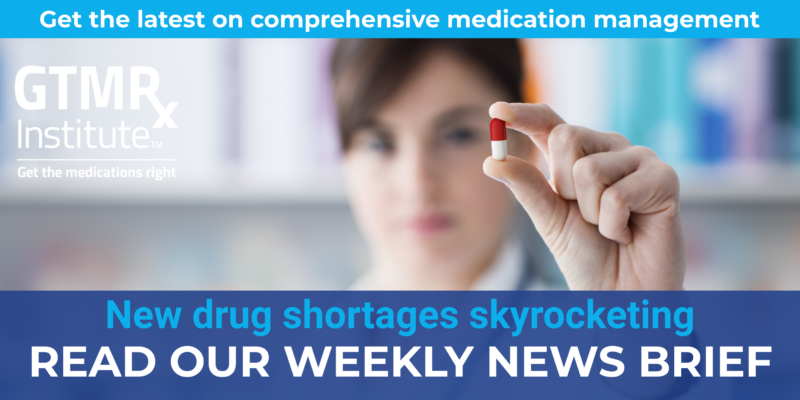New drug shortages skyrocketing
Drug shortages are growing dramatically. For example, children’s flu medications, common antibiotics, and ADHD treatments are getting harder to buy, according to a report from the Senate Homeland Security and Governmental Affairs. It finds that the number of new drug shortages rose by 30% between 2021 and 2022, an increase that has had “devastating consequences” for patients and doctors. Towards the end of 2022, nearly 300 individual drugs were considered in short supply, affecting treatment for conditions ranging from colds to cancer. (NPR; report)
Ohio AG goes after Humana, Cigna, Prime Therapeutics
Ohio’s price-fixing lawsuit against several firms that manage billions of dollars in drug benefits highlights the new tactic of using overseas subsidiaries, The Wall Street Journal reports. Ohio Attorney General Phillip Yost alleges that Cigna-owned Express Scripts, Prime Therapeutics and Humana’s PBM?engaged in price fixing that ultimately harmed vulnerable Ohio pharmacies and patients. They allegedly shared pricing and other information gathered by a Swiss subsidiary to gain leverage during negotiations with drugmakers for rebates. Yost called PBMs “modern gangsters.” (Healthcare Dive; Wall Street Journal)
Practice Transformation
Mark Cuban continues to add brand-name drugs
Mark Cuban Cost Plus Drug Co., which entered the brand-name market last month, now offers three brand-name products made by Janssen, a Johnson & Johnson business: Invokana (canagliflozin), Invokamet (canagliflozin-metformin HCl) and Invokamet XR (canagliflozin-metformin HCl). Invokana, a type 2 diabetes drug, typically costs more than $675; Cuban’s price is $243.90. As The Street points out, Cuban has scored its first big win in its mission to disrupt the pharmaceutical industry; Invokana is its first non-generic blockbuster. (The Street; Becker’s Hospital Review)
Evidence & Innovation
The power of negative thinking: Nocebo effect
People who had low hopes from a COVID-19 vaccine reported more negative side effects, according to research published in JAMA Network Open. This illustrates the “nocebo” effect, researchers explain. Managing patient expectations may help address this: “Clinician-patient interactions and public vaccine campaigns may both benefit from these insights by optimizing and contextualizing information provided about COVID-19 vaccines. Unfavorable nocebo-related adverse effects could then be prevented, and overall vaccine acceptance could be improved.” (JAMA Network Open; Medscape)
Antibiotic crisis worsens
As drug-resistant bacteria continues to rise, only 27 new antibiotics are in the clinical trial stage of drug development. Just six of them are considered innovative enough to overcome antibiotic resistance, NBC News reports. If drugmakers don’t start developing new antibiotics soon, the world may be facing a “doomsday scenario,” WHO officials warn. More people could die from once-treatable infections, such as bacterial pneumonia, gonorrhea, or salmonella. Meanwhile, US lawmakers are debating the PASTEUR Act, which would pay pharmaceutical companies contractually to make these critical new drugs available. (NBC News)
Policy Solutions
Brain cancer: Using genetic data to get to therapy sooner
We know genetic markers can predict a person’s likelihood of developing various types of cancer. Now, according to research published in Nature Medicine, DeepGlioma can pinpoint genetic mutations in brain tumors during surgery within just 90 seconds, making it easier for doctors to decide on therapeutic approaches for patients with certain types of brain tumors. Researchers hope that by more quickly identifying genomic data in cancerous tumors, the DeepGlioma test could potentially help more patients get into clinical trials sooner. (Fierce Biotech; Fox News; Nature Medicine)
In Case You Missed It!
Learn about the peer-reviewed evidence showcasing the value of CMM, through improvements in access to care, provider work life, outcomes and patient satisfaction as well as a reduction in costs. These findings outline the CMM team-based care process that can be implemented in a variety of health care systems to ensure positive patient outcomes.
Developed by the Evidence-Based Resources Subgroup of the Practice and Care Delivery Transformation Workgroup.
NEW 2022 GTMRx Resource | Comprehensive Medication Management via Telehealth Modality in Team-Based Care:A Review of the Evidence on Quality, Access and Costs, December 2022
Learn about the peer-reviewed evidence showcasing the value of CMM delivered as a service via telehealth and its challenges. Telehealth is a promising modality to improve access to care, facilitate patient monitoring and maintain the needed connection with patients that improves their care and health.
Developed by the Evidence-Based Resources Subgroup of the Practice and Care Delivery Transformation Workgroup.

Join us to be part of meaningful change
Irma, like many others, struggles as a result of our current trial-and-error approach to medication. That is why we advocate for a new, comprehensive approach to medication use and prescribing. As a non-profit 501(c)(3) and 501(c)(4) organization, the GTMRx Institute and Foundation relies on funding from our supporting members. We ask that you consider becoming a Supporting Signing Member so we can continue to provide relevant, timely resources to get the medications right!
If you’re interested in supporting the Institute or Foundation at a higher level, please contact us. Your dollars will bring about meaningful change for people like Irma.
AmazonSmile is an easy way for 0.5% of your qualified purchases go to the GTMRx Foundation at no cost to you. And signing up is simple—go to smile.amazon.com and select “Get the Medications Right Foundation” as your charity of choice. If you prefer to directly donate instead, you can do so here.
Adding the foundation on AmazonSmile will help us continue to provide no cost educational webinars, issue briefs, weekly news briefs and promote the need for transformation of our current system of medication use through social media campaigns.




